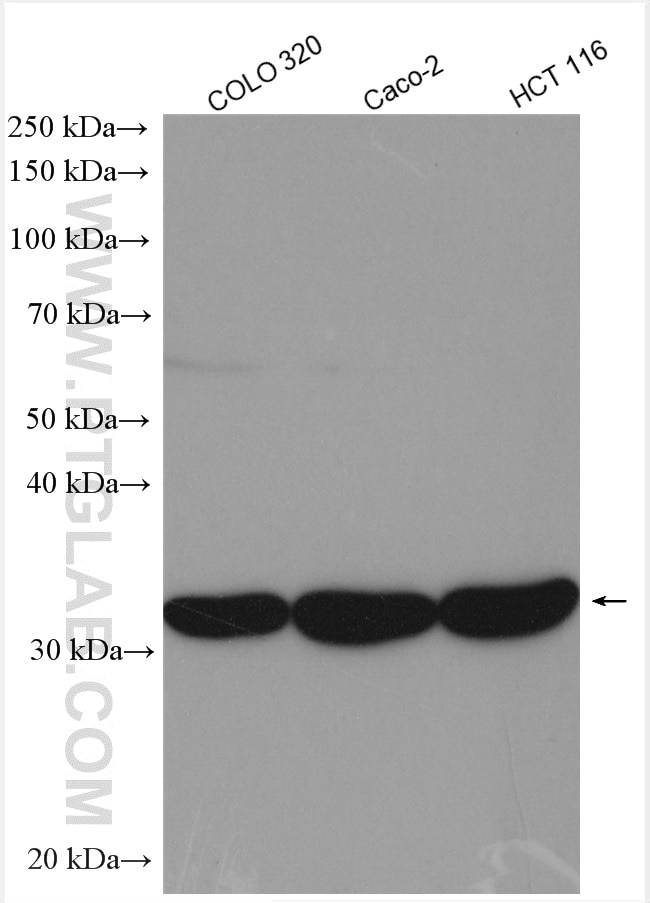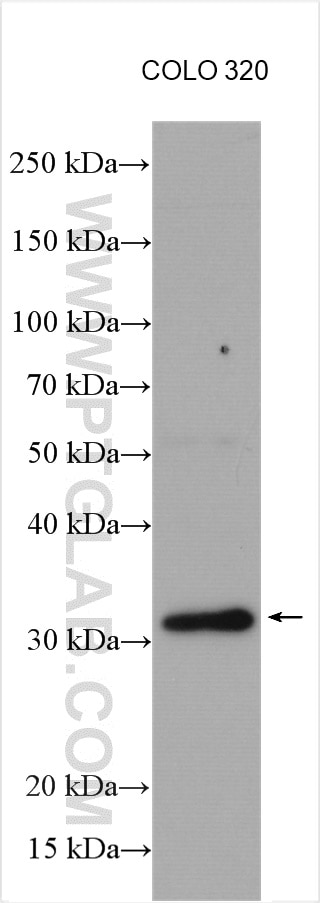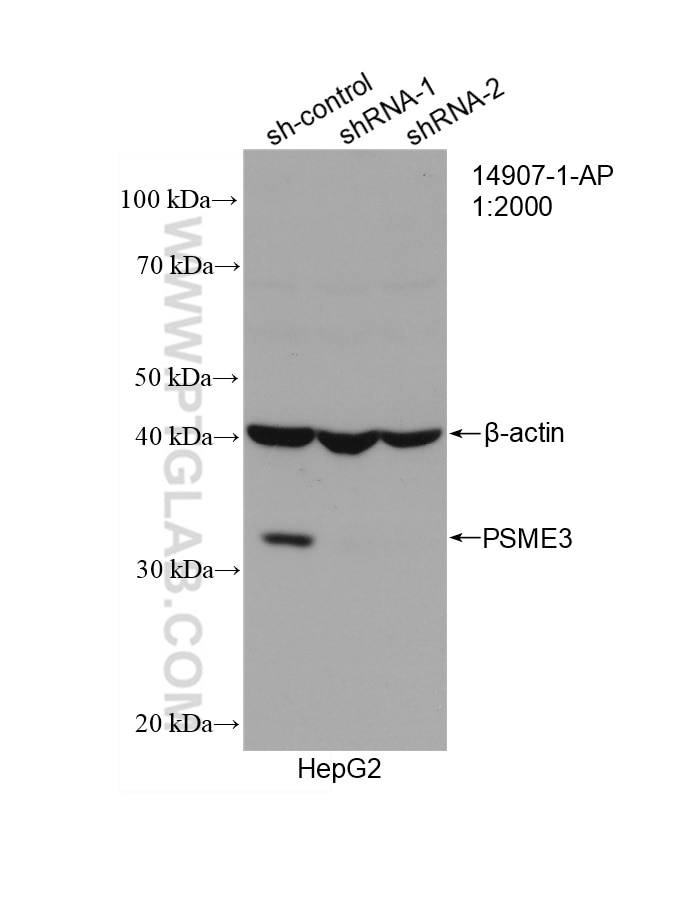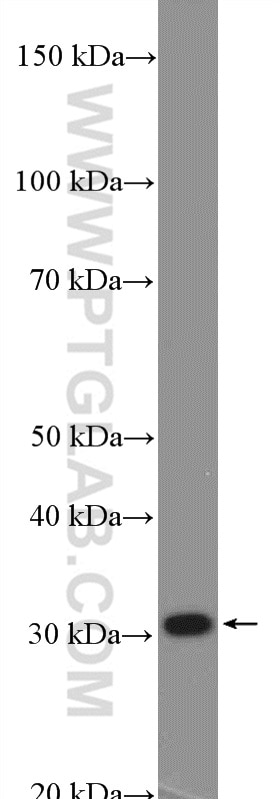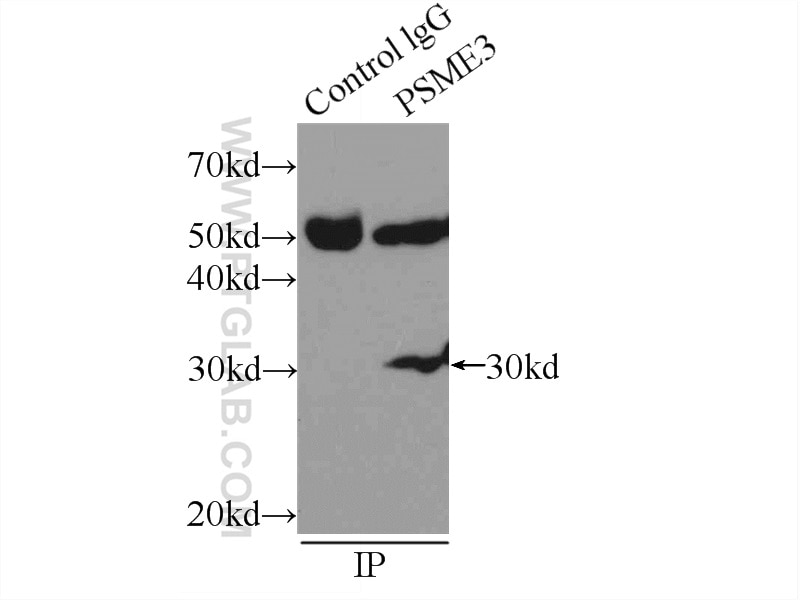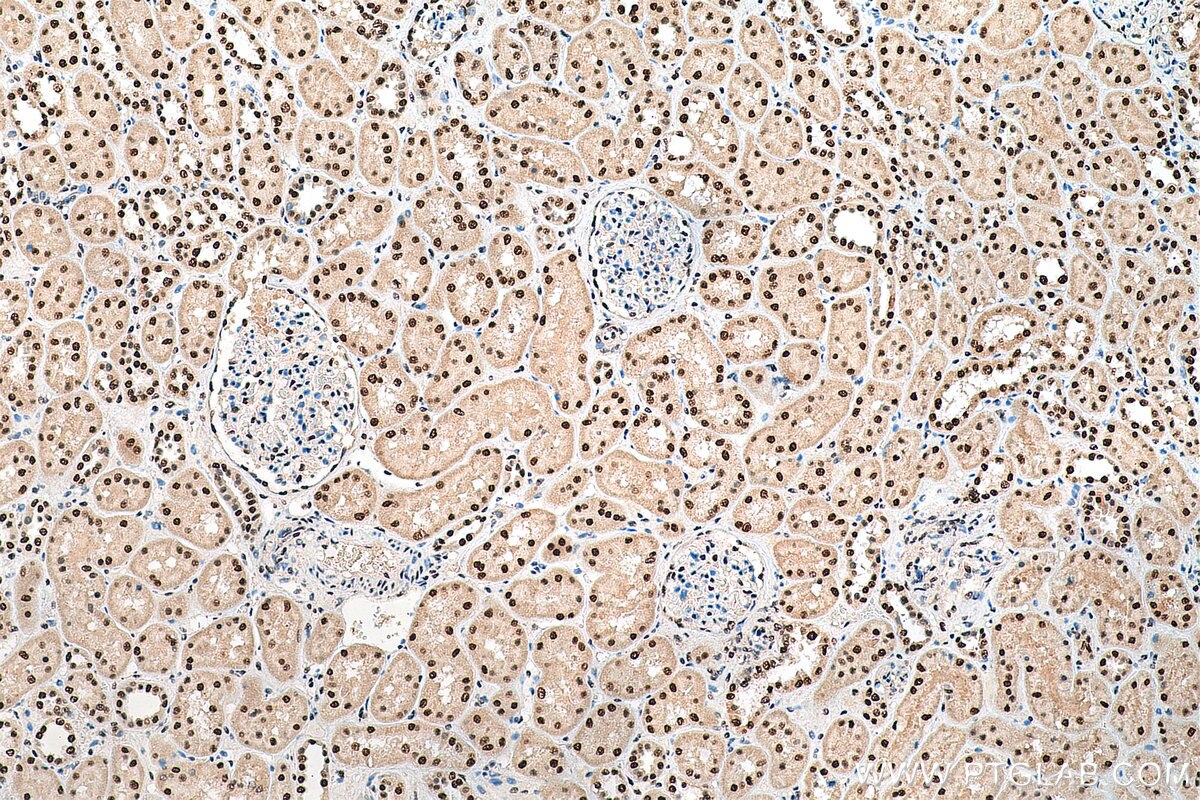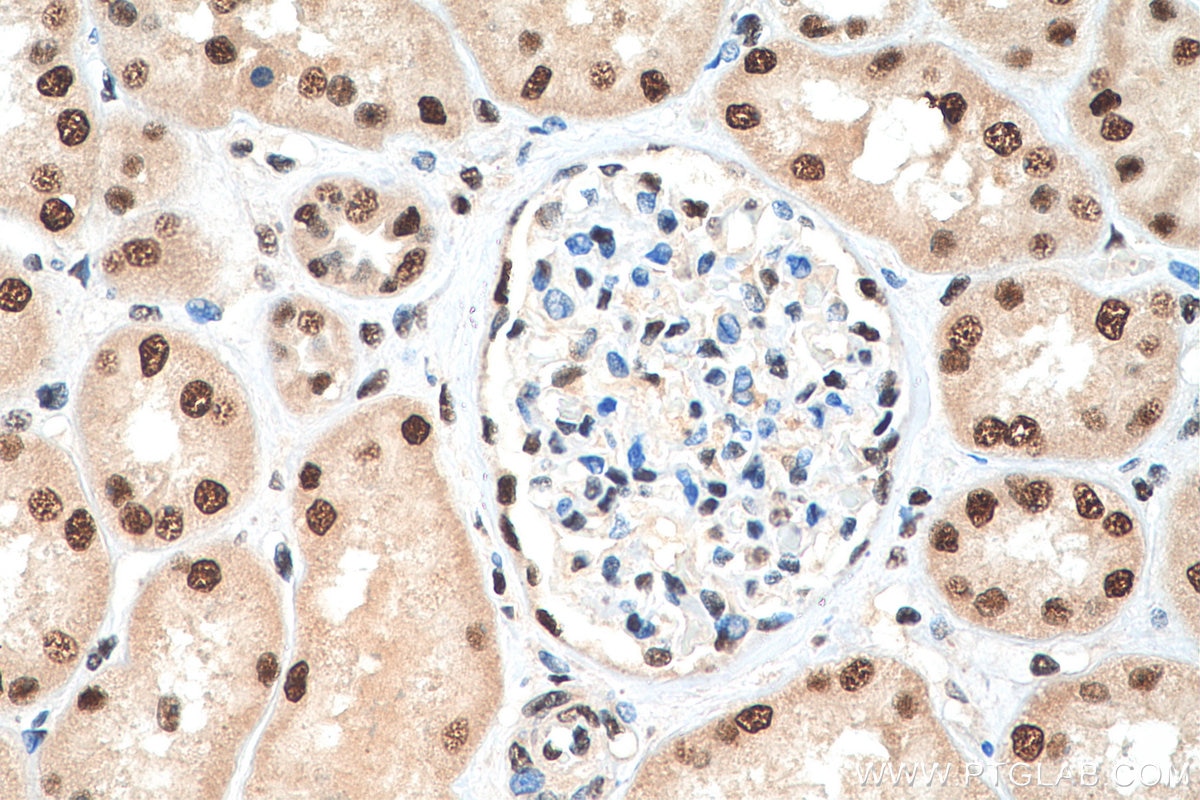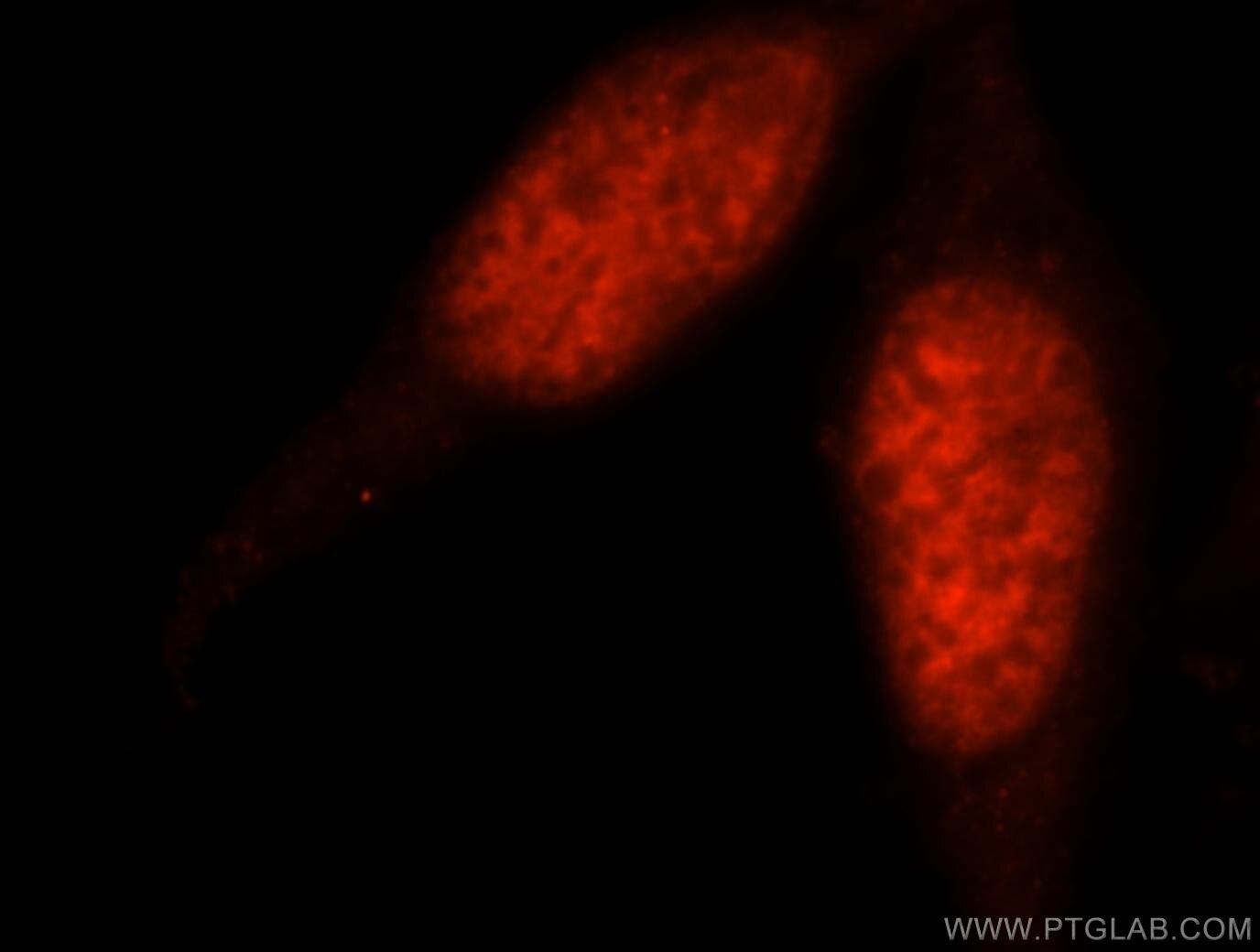- Featured Product
- KD/KO Validated
PSME3 Polyclonal antibody
PSME3 Polyclonal Antibody for WB, IP, IF, IHC, ELISA
Host / Isotype
Rabbit / IgG
Reactivity
human, mouse, rat
Applications
WB, IP, IF, IHC, ELISA
Conjugate
Unconjugated
Cat no : 14907-1-AP
Synonyms
Validation Data Gallery
Tested Applications
| Positive WB detected in | COLO 320 cells, mouse spleen tissue, HepG2 cells, Caco-2 cells, HCT 116 cells |
| Positive IP detected in | COLO 320 cells |
| Positive IHC detected in | human kidney tissue Note: suggested antigen retrieval with TE buffer pH 9.0; (*) Alternatively, antigen retrieval may be performed with citrate buffer pH 6.0 |
| Positive IF detected in | HepG2 cells |
Recommended dilution
| Application | Dilution |
|---|---|
| Western Blot (WB) | WB : 1:1000-1:4000 |
| Immunoprecipitation (IP) | IP : 0.5-4.0 ug for 1.0-3.0 mg of total protein lysate |
| Immunohistochemistry (IHC) | IHC : 1:50-1:500 |
| Immunofluorescence (IF) | IF : 1:10-1:100 |
| It is recommended that this reagent should be titrated in each testing system to obtain optimal results. | |
| Sample-dependent, Check data in validation data gallery. | |
Published Applications
| KD/KO | See 2 publications below |
| WB | See 3 publications below |
| IHC | See 3 publications below |
| IF | See 1 publications below |
Product Information
14907-1-AP targets PSME3 in WB, IP, IF, IHC, ELISA applications and shows reactivity with human, mouse, rat samples.
| Tested Reactivity | human, mouse, rat |
| Cited Reactivity | human |
| Host / Isotype | Rabbit / IgG |
| Class | Polyclonal |
| Type | Antibody |
| Immunogen | PSME3 fusion protein Ag6702 |
| Full Name | proteasome (prosome, macropain) activator subunit 3 (PA28 gamma; Ki) |
| Calculated Molecular Weight | 30 kDa |
| Observed Molecular Weight | 30 kDa |
| GenBank Accession Number | BC001423 |
| Gene Symbol | PSME3 |
| Gene ID (NCBI) | 10197 |
| RRID | AB_2171098 |
| Conjugate | Unconjugated |
| Form | Liquid |
| Purification Method | Antigen affinity purification |
| Storage Buffer | PBS with 0.02% sodium azide and 50% glycerol pH 7.3. |
| Storage Conditions | Store at -20°C. Stable for one year after shipment. Aliquoting is unnecessary for -20oC storage. 20ul sizes contain 0.1% BSA. |
Background Information
PSME3 gene encodes proteasome activator complex subunit 3, which is also called REG-gamma or PA28-gamma. REG-gamma activates the trypsin-like catalytic subunit of the proteasome thus is a proteasome regulator. MDM2-TP53 interaction which promotes ubiquitination- and MDM2-dependent proteasomal degradation of TP53, may be promoted by REG-gamma resulting in inhibited apoptosis after DNA damage. REG-gamma may also be involved in cell cycle regulation.
Protocols
| Product Specific Protocols | |
|---|---|
| WB protocol for PSME3 antibody 14907-1-AP | Download protocol |
| IHC protocol for PSME3 antibody 14907-1-AP | Download protocol |
| IF protocol for PSME3 antibody 14907-1-AP | Download protocol |
| IP protocol for PSME3 antibody 14907-1-AP | Download protocol |
| Standard Protocols | |
|---|---|
| Click here to view our Standard Protocols |
Publications
| Species | Application | Title |
|---|---|---|
Cancer Lett Proteasome activator subunit 3 promotes pancreatic cancer growth via c-Myc-glycolysis signaling axis. | ||
EBioMedicine Indirubin-3'-monoxime acts as proteasome inhibitor: Therapeutic application in multiple myeloma.
| ||
Retrovirology Comparative host protein interactions with HTLV-1 p30 and HTLV-2 p28: insights into difference in pathobiology of human retroviruses. | ||
PeerJ REG γ knockdown suppresses proliferation by inducing apoptosis and cell cycle arrest in osteosarcoma.
| ||
Nat Aging Cold temperature extends longevity and prevents disease-related protein aggregation through PA28γ-induced proteasomes |
Reviews
The reviews below have been submitted by verified Proteintech customers who received an incentive forproviding their feedback.
FH Laetitia (Verified Customer) (03-21-2024) | Finding antibodies specific to avian proteins is very difficult. I have tried different antibodies from different companies so far. This antibody is by far the best (cost efficient as well)
|
